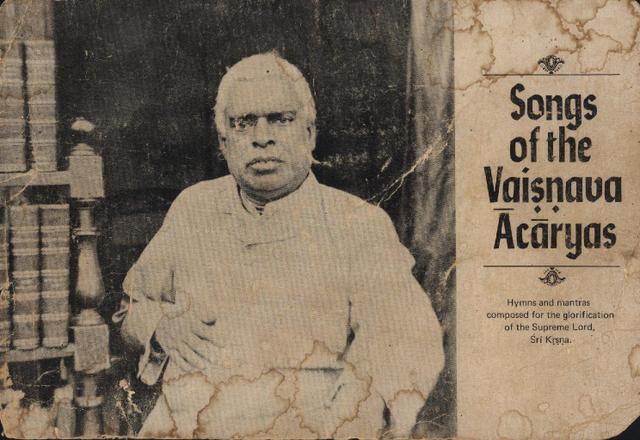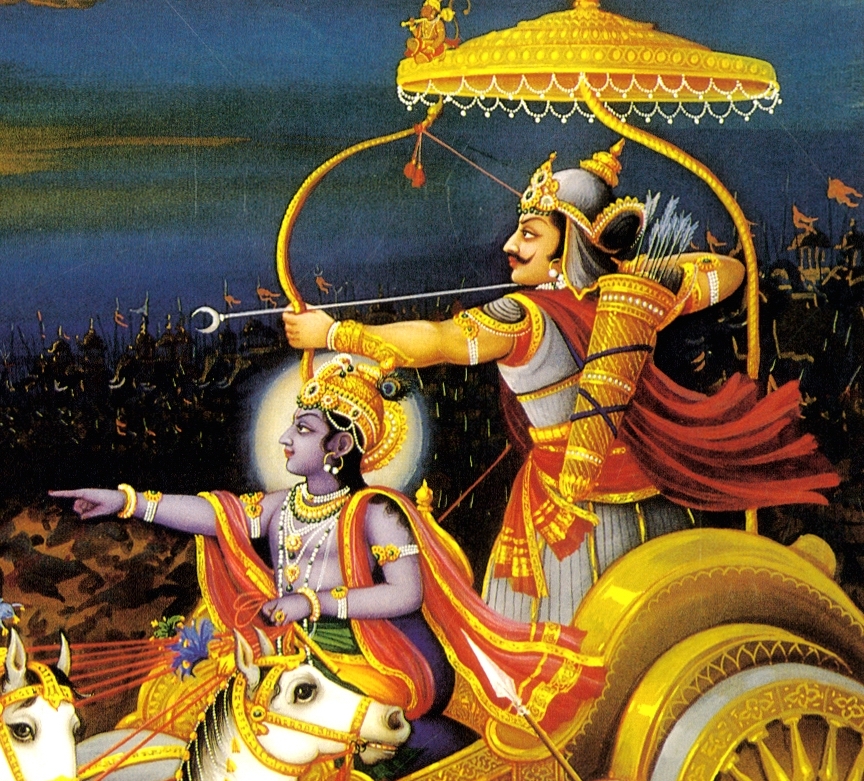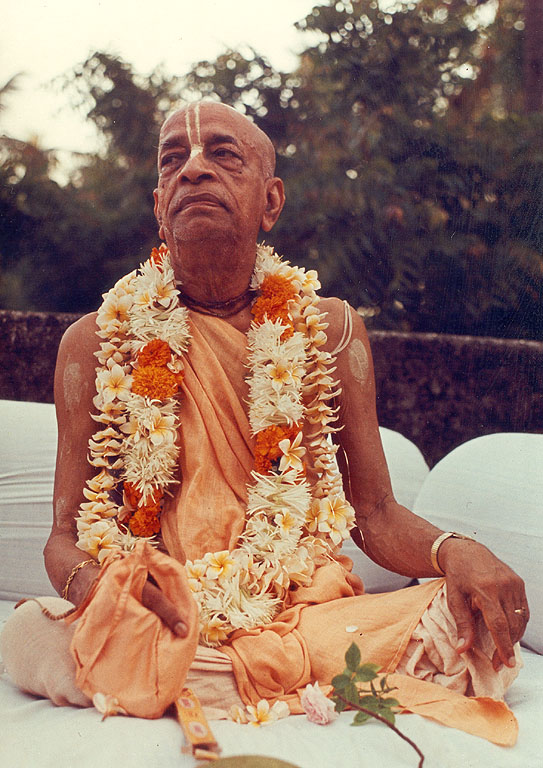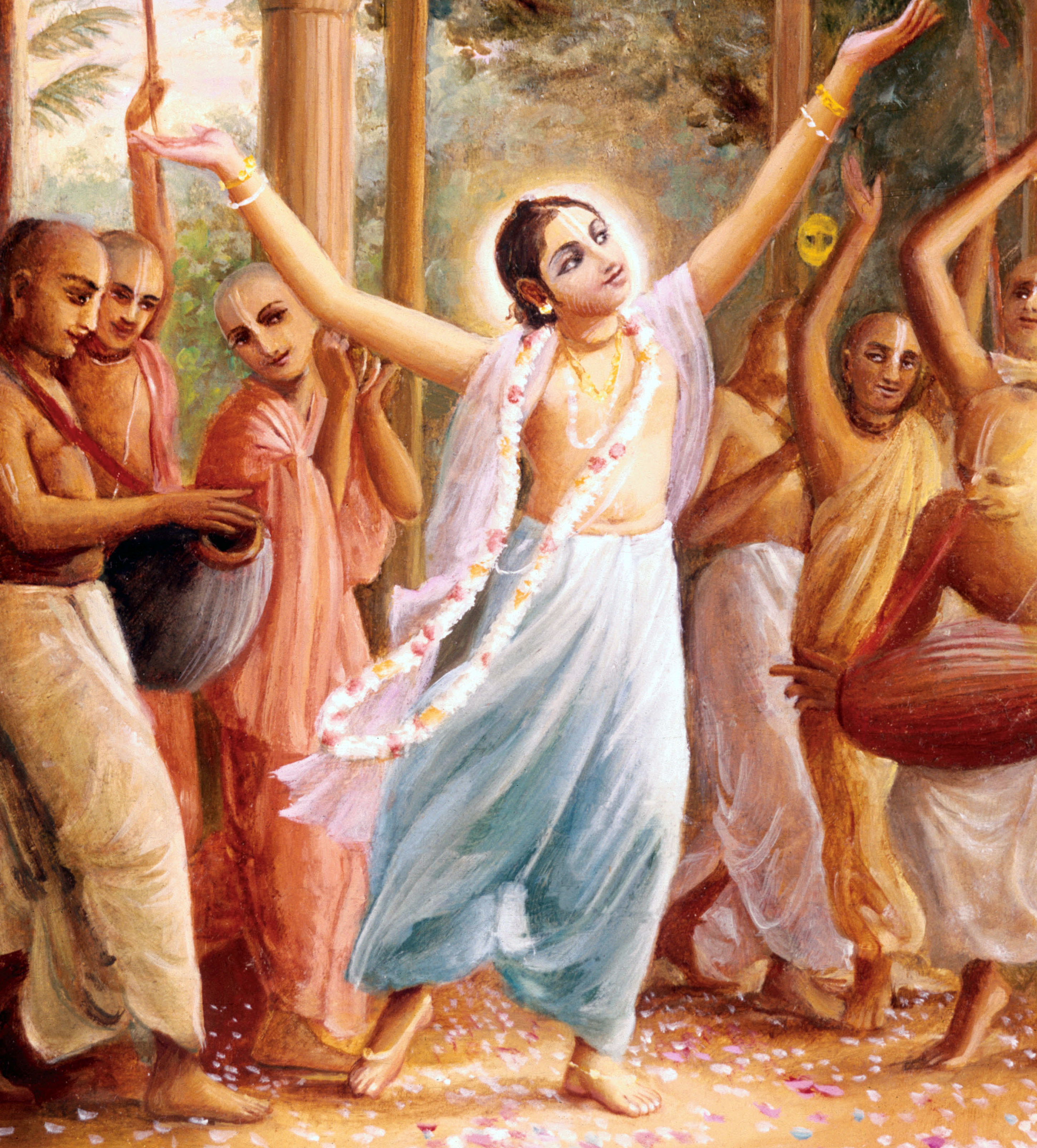Vṛndāvana Bhajana
Written by A.C. Bhaktivedanta Swami in 1958,
Published December of that Year in Gauḍīya Patrika,
The Magazine of the Gauḍīya Vedānta Samiti.
Verse 1.
I am sitting alone in Vṛndāvana-dhāma
In this mood I am getting many realizations.
I have my wife, sons, daughters, grandsons, everything,
But I have no money so they are a fruitless glory.
Kṛṣṇa has shown me the naked form of material nature,
By his strength it has all become tasteless to me today.
yasyāham anugṛhṇāmi hariṣye tad-dhanaṁ śanaiḥ
“I gradually take away all the wealth of those upon whom I am merciful.”
How was I able to understand this mercy of the All-merciful?
Verse 2.
Everyone has abandoned me, seeing me as penniless,
Wife, relatives, friends, brothers, everyone.
This is misery, but it gives me a laugh. I sit alone and laugh.
In this māyā-saṁsāra, whom do I really love?
Where have all my loving father and mother gone to now?
And where are all my elders, who were my own folk?
Who will give me news of them, tell me who?
All that is left of this family life is a list of names.
Verse 3.
Like the froth on the sea water mixes again in the sea,
Māyā’s saṁsāra’s play is just like that.
No one is mother or father, or personal relative,
Just like the sea-foam they remain but a short time,
Just as the froth on sea water mixes again in the sea,
The body made of five elements meets with destruction.
How many bodies does the embodied soul take in this way;
His relatives are all simply related to this temporal body.
Verse 4.
But everyone is your relative, brother? on the spiritual platform.
This relationship is not tinged with the smell of māyā.
The Supreme Lord is the soul of everyone,
In relation to Him, everyone in the universe is the same.
All your relatives, brother! All the billions of jīvas.
When seen in relation to Kṛṣṇa they are all in harmony.
Forgetting Kṛṣṇa, the jīva desires for sense gratification,
And as a result he is firmly grasped by māyā.
Verse 5.
As a result of past activities he takes on different types of body.
Absorbed in that dress he remains forgetful of Śrī Hari.
Therefore māyā gives him so many kinds of miseries
And although he bobs up and down in this ocean of misery,
he still thinks that he is happy.
Lying on a bed, suffering greatly, having been sick a long time
“I am very well today,” he says laughing.
I get a laugh out of his “feeling very well”
This is the way the soul conditioned by māyā feels “well”
Verse 6.
How many plans they have to remain “well”
But time and time again nature destroys them.
daivī hy eṣā guṇamayī that is the Supreme Lord’s māyā.
Try to understand exactly the meaning of their “feeling well”;
No one is well in the whole world, but still they are saying
In this way māyā cheats the conditioned soul.
But, ignoring that he is being cheated, he remains absorbed in māyā;
And although māyā kicks him, he will not give up his mistaken conception.
Verse 7.
Again and again making plans, and again and again they are destroyed.
Sometimes he falls on the dry earth and sometimes in the mud.
In this way the universe is filled with wandering jīva souls
who finally by the grace of Guru and Kṛṣṇa get bhakti-the eternal wealth.
Gaining that wealth if they can give up all other so-called wealth,
Then very easily he crosses over the ocean of saṁsāra.
There on the other side is unparalled spiritual variegatedness.
There he enjoys in eternal happiness and peace.
Verse 8.
The mad say, “There everything is formless,
Without special feature like a kind of nothing.”
He is actually the storehouse of spiritual tastes—raso vai saḥ
The intelligent knowers of tastes serves him becoming his subordinate
Śānta, dāsya, sakhya, vātsalya are those tastes and
The best of all, mādhurya, is the essence of them all.
But in the spiritual world all these tastes are relishable,
Whereas the material tastes are just shadow reflections and are all contemptible.
Verse 9.
One who worships Kṛṣṇa is clever
But one who worships māyā is a pauper.
Becoming a pauper one engages in temporary pastimes
Without knowledge of the true relationships of things he
simply becomes bound up in māyā’s knot.
Arjuna and Duryodhana both fought in the same war,
But Arjuna was the best devotee and Duryodhana died.
on one battlefield both dear and detestable
One who is intelligent will be able to understand.
Verse 10.
One who fights the war of life knowing his true relationship,
He will remain alive while all others will perish.
One who does not know his relationship, and takes up some other path,
He will never attain love of god, and his whole life is useless.
First understand properly your relationship with Kṛṣṇa
And then keeping that relationship, go and fight with māyā.
Other than this all the heroes of jñāna and karma
Never attained liberation, they were all uncertain.
Verse 11.
In name only they were great sober and unaffected men,
They were all unpeaceful.
Desiring liberation, sense gratification or mystic powers, all had uncontrolled senses.
The uncontrolled senses don’t answer to the potency of yoga.
How many yogis and munis there were, and always the senses remained independent.
Without service of the master of the senses there can be no sense control.
They all return to material activities after a short term of peace.
By the process of yoga, no one ever attains sense control.
This is explained extensively in the Vedas and Purāṇas.
Verse 12.
Viśvāmitra sat on the yogic āsana
But he desired the pure beauty Śakuntalā.
In this way the yogis fall down, what to speak of the jñānīs
And the karmīs are all just asses, suffering in all respects.
The one to whom Kṛṣṇa is merciful and gives His instruction,
Becomes equally as fortunate as Arjuna.
But one who fights for his own happiness’ sake
He, like Duryodhana, dies along with his family.
Verse 13.
One who always fights on behalf of Kṛṣṇa,
Wealth, power, knowledge are all within his grasp.
Understand properly the Gītā’s message
You will attain Kṛṣṇa’s service and will worship Śrī Hari,
The devotees are endowed with all qualities,
So what are “non-violence” or “freedom from anger” to them?
Verse 14.
Śrī Hari teaches the living entities by means of his devotees,
one such helper is Pārtha.
Arjuna acted just like a conditioned soul
Like one bewildered was the Pāṇḍava brother
Violence to his relatives and then enjoyment of the Kingdom
Could this be happiness? Arjuna showed lamentation.
This though, was all dehātma-buddhiḥ identification with the body
one who is a kṣatriya gives up such family affection on the battlefield.
Verse 15.
Kṛṣṇa, seeing his illusion, chastised him
Therefore Arjuna accepted the position of disciple
Becoming a disciple he listened to the Bhagavad-gītā.
All his ignorance dissipated as well as his material bondage.
His material bondage was cut, but he was not dressed as a sannyāsī.
The householders understand the Gītā’s meaning this way.
The perfection of mantras, kariṣye vacanaṁ tava
Therefore the war that he fought brought him an increase in fame.
Verse 16.
The Vaiṣṇavas have no desire, they all chant japa on their beads.
So what kind of Vaiṣṇava is this Arjuna in the middle of saṁsāra?
The Vaiṣṇava freed from duality simply chants japa on his beads,
So say those who are eating the mind’s bananas.
The Vaiṣṇava is without desire, and amicable by nature
But he is not a forceless weakling as people foolishly think.
In two great Indian wars, two great personalities;
Leaders amongst the Vaiṣṇavas and were victorious.
Verse 17.
Because of desire for the satisfaction of his own senses he would not fight.
But he is one who is known by everyone as a Vaiṣṇava.
Those who do not see the real Vaiṣṇavas say that a Vaiṣṇava is inactive.
But the Vaiṣṇava is always active in the service of the Lord.
The lifeless kaniṣṭha-adhikārīs don’t perform any service.
For profit adoration and prestige they stay in their lonely place,
Nityānanda prabhu, who is worshipable by the Vaiṣṇavas
Suffered blows, but still distributed love of God one after the other.
Verse 18.
Gaura Hari came with the cakra in His hand and gave punishment,
After that the Vaiṣṇava haters were subdued.
The Lord sets example Himself to teach the jīvas
So one who performs nirjana bhajana simply cheats himself.
The world has now become full of Jagāis and Mādhāis
The Nityānanda Vaṁśa has increased its following of disciples.
But eating, sleeping, wearing the dress, but remaining unconcerned
It is not proper for the Vaiṣṇavas to remain so uncompassionate.
Verse 19.
Śrīla Cakravartī Ṭhākura says in his Mādhurya Kaḍambinī
Just see his conclusion and what is his judgement.
Devotional service is causeless and self-manifesting
But the Eternally Perfect Substance is always covered over.
The madhyama-adhikārī therefore being compassionate
Gives mercy to the innocent souls by awakening devotion in them.
The Supreme Lord acts according to the will of the Vaiṣṇavas,
Therefore by the mercy of the Vaiṣṇavas the bewildered can be awakened.
Verse 20.
The Vaiṣṇavas can awaken the sleeping world
By their mercy the sinful can all become devotees.
Therefore they do not perform nirjana bhajana,
That is the world cheating process of the kaniṣṭha-adhikārī
All the big big famous vaishnavas were in assembly
And Padri Saheb came in to meet them
He asked some questions about Kṛṣṇa’s līlā in Vṛndāvana
But that association of venerable Vaiṣṇavas was not able to enlighten him as to the real truth.
Verse 21.
The kaniṣṭha-adhikārīs do not understand these scriptures
In the false pride of being alone they simply hunt for chapatis and dal.
Our spiritual master said these are all kaniṣṭha
Now I can understand the truth of what he said.
One well versed in the scripture and who has strong faith
Is an uttama-adhikārī and can deliver the whole world.
He is the deliverer of the most fallen and is famous through the world.
Now, save this fallen one and thus become really famed.
Verse 22.
In the Kali-yuga the jīvas are all fallen and the lowest of mankind.
Seeing they do not see the different activities
The Supreme Lord Gaurasundara is the most magnanimous
And His instructions are all full of nectar.
One who has taken his birth in the land of Bharata
Should engage in welfare activities according to His instructions.
The Supreme Lord’s līlā was to relish mellows in the nirajana
But it is not the play of Vaiṣṇavas to imitate these activities.
Verse 23.
This transcendental service cannot actually be tasted by those who are not Vaiṣṇavas.
In the material body one cannot relish this transcendental nectar.
One who has the material concept that the body is his self
Cannot relish spiritual mellows.
But those who have conceptions of the Vaiṣṇavas in terms of birth etc.
Are very bold when it comes to relishing the līlās of the Lord.
Like the clerk in the post office, one caste goswami.
The bābājīs all pay their obeisances to him a lot.
Verse 24.
The Gosāi Ṭhākura has false pride in his birth
Which Nityānanda Prabhu cut into pieces.
I see all these things going on in Vṛndāvana
Therefore I can understand that there is some work to be done here
The prākṛta-sahajiyās all commit adultery
Taking someone else’s wife they go to relish transcendental līlā.
This is not Vṛndāvana as always think like this my dear mind
Remember the Lotus feet of the six gosvāmīs.
Verse 25.
The six gosvāmīs came and preached religious life
They saved the process of devotional service on the order of Lord Caitanya.
They are all eternally perfect associates of the Lord and always remember Rādhā and Kṛṣṇa
Remembering them all the conditioned souls sins are cleared away
But if he tries to imitate them taking on their dress and characteristics
He becomes the plaything of māyā and does not cross over the material ocean
Always preach! From jīva’s door to door
Your life will be successful as a result of your preaching.
Verse 26.
Śrī Dayitā dāsa prabhu gave this instruction
“Chant Hare Kṛṣṇa loudly, this is my initiation:
Kīrtana is not just drums and karatālas
The sound of kīrtana is not this modern system
Anything favourable for devotional service is all Mādhava
And the only enjoyer of the three worlds is Yadava
Māyā’s pride and joy, the radio sound
Destroy them all by forceful kīrtana.
Verse 27.
Māyā’s is all these newspapers
Preach that throughout the whole world.
Sitting alone in your room shouting, you may increase your bile’s secretion
But in ten million births Śrī Hari won’t be pleased.
Śrī Hari is no one’s father’s property
Come out of your cage, stop making objection
Everything belongs to Śrī Hari and Śrī Hari belongs to everyone.
Chant the Hare Kṛṣṇa mantra loudly
By the performance of such saṅkīrtana there will come remembrance automatically
Then there will be nirjana bhajana manifested in the heart spontaneously.
Text pasted from Prabhupada Books








